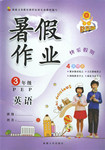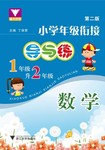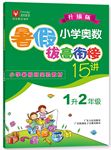题目内容
-So how long have you been in Sichuan?
-Just a couple of days.I'm on a great tour, you know, and I ________ all the places of interest here.
- A.visited
- B.am visiting
- C.have visited
- D.have been visiting
考查动词时态。根据题干中I'm on a great tour,可知现在说话者还在旅途中,因此选B,用现在进行时的形式表示将来时的意思,意思为打算、计划做某事。

 学练快车道快乐假期暑假作业新疆人民出版社系列答案
学练快车道快乐假期暑假作业新疆人民出版社系列答案 浙大优学小学年级衔接导与练浙江大学出版社系列答案
浙大优学小学年级衔接导与练浙江大学出版社系列答案 小学暑假作业东南大学出版社系列答案
小学暑假作业东南大学出版社系列答案 津桥教育暑假拔高衔接广东人民出版社系列答案
津桥教育暑假拔高衔接广东人民出版社系列答案 波波熊暑假作业江西人民出版社系列答案
波波熊暑假作业江西人民出版社系列答案
| |||||||||||||||||||||||||||||||||||||||||||||||||||||||||||
Below is some advice on how to sleep better.
1. Maintain a regular bed and wake time schedule
Go to bed at the same time every night. Choose a time when you normally feel tired, so that you don’t toss or turn. Try not to break this routine on weekends when it may be tempting to stay up late. If you want lo changeyour bedtime, help your body adjust by making the changein small daily increments, such as 15 minutes earlier or later each day. As with your bedtime, try to maintain yourregular wake-time even on weekends.
2.Fight after-dinner drowsiness(睡意)
If you find yourself getting sleepy before your bed-time, get off the couch and do something mildly stimulating to avoid falling asleep, such as washing the dishes, calling a friend, or getting clothes ready for the next day. If you give in to the drowsiness, you may wake up later in the night and have trouble getting back to sleep.
3. Keep your room dark and cool
When it’s time to sleep, make sure that your environment is dark. Even dim light —especially those from TV or computer screens —can confuse the body clock. Heavy curtains or shades can help block light from windows, or you can try an eye mask to cover your eyes. The temperature of you r bedroom also affects sleep. A bedroom that is too hot or too cold can interfere with quality sleep.
r bedroom also affects sleep. A bedroom that is too hot or too cold can interfere with quality sleep.
4. Turn off your television
Many people use the television to fall asleep or relaxat the end of the day. You may even have a television inyour bedroom. However, television actually stimulates themind, rather than relaxing it. Part of this is due to content. Late night news and prime time shows frequently have disturbing, violent mat erial. Even non-violent programming can have commercials that are jarring and loud.
erial. Even non-violent programming can have commercials that are jarring and loud.
5. Exercise early
Exercise helps promote restful sleep if it is done several hours before you go to bed. Exercise can help you fall asleep faster and sleep more soundly— as long asit ’s done at the right time. Try to finish exercising at least three hours before bed or work out earlier in the day.
6. Consult your doctor
Use a sleep diary and talk to your doctor. Note what type of sleep problem is affecting your sleep or if you aresleepy when you wish to be awake and alert. Try these tips and record your sleep and sleep-related activities in a sleep diary. If problems continue, discuss the sleep diary with your doctor. There may be an underlying cause and you will want to be properly diagnosed. Your doctor will help treat the problem or may refer you to a sleep specialist.
【小题1】To prevent yourself from sleeping too much on weekends, you should________.
| A.go lo bed 15 minutes earlier than usual |
| B.go to bed at usual time |
| C.go to bed at any time |
| D.make an adjustment to your bedtime |
| A.Watching violent programmesbefore going to bed. |
| B.Changing your bedtime only a little every day. |
C.U sing heavy curtains or an eye mask to block light. sing heavy curtains or an eye mask to block light. |
| D.Completing your workout just before bedtime. |
| A.making a telephone call |
| B.doing some washing |
| C.getting clothes ready for the next day |
| D.having a rest on the sofa |
| A.move into a new house |
| B.discuss it with your family |
| C.change your present job |
| D.turn to the doctor for help |